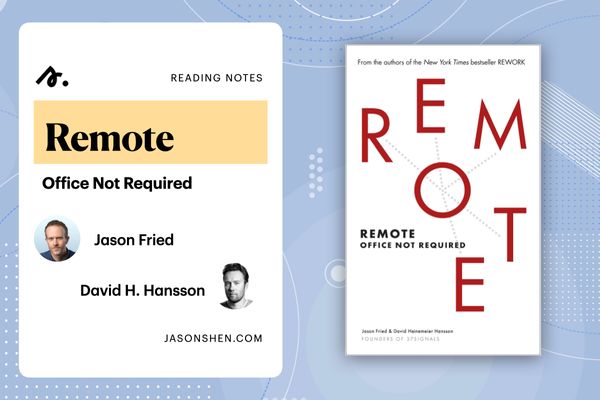I just finished reading Remote: Office Not Required, by Jason Fried and David Heinemeier Hansson, partners at 37Signals and makers of Basecamp.
It’s a great read and here’s the basic premise:
- In today’s economy, the quest for talent is so great that organizations can no longer afford to merely look at individuals co-located in their physical presence (their metro area)
- It is easier than ever to coordinate the work of individuals from around the world with just a good internet connection and a few pieces of web-based software (including 37Signal’s own products)
- There are many drawbacks to forcing people to work in an office and many perks to allowing them to work (even a few days a week) at home / at a cafe or coworking space that benefit both the remote worker and the organizations that employ them
- There are simple ways to address many of the concerns people have with remote working (review the work, not time in seat; put relevant information where it can be seen by all, overlap working hours, etc)
- There is a tipping point coming with remote work. Many organizations large and small, from across many industries, are using remote workers and it’s time you (the reader) became an early adopter.
They actually went out and interviewed a bunch of companies that do remote work as well so REMOTE is not just “the edgy opinions of Fried and DHH”. The book has useful tips for making the case for remote work to your boss (or to your team, if you are the boss). There’s a lot of value in learning how to structure a good remote work environment.
But personally, I got a bigger shift in perspective from something else.
My biggest takeaway from REMOTE:
The shift to remote work will be driven by Millenials. As our generation rises into leadership roles within organizations, we will understand exactly how silly the “butts in seats at the office = work” mentality is and push for flexible working options.
Midway through the book, Fried and DHH make a great point:
“But past generations have been bred on the idea that good work happens from 9am to 5pm, in offices and cubicles in tall buildings around the city.
The future, quite literally, belongs to those who get it. Do you think today’s teenagers, raised on Facebook and texting, will be sentimental about the old days of all-hands-on-deck, Monday morning meetings? Ha!”
Gen-Y has been remote working all through college
I remember working on a number of student groups at Stanford where we might have had meetings once a week for an hour or two where we’d talk about what needed to get done, and then actually did the work on our own – in the morning, during lunch, after classes, wherever we could sneak it in. We all trusted each other to get the work done, communicated with Google Docs and email lists. Because we had action items each week, it was very clear when someone wasn’t pulling their weight.
Our generation just gets it. I’ve collaborated with people like Sebastian Marshall on various projects, from guest posts to GGW sessions to collaborating on the foreword for my first book. And we have never even met in person! I’d love to grab beers with him but it’s never been a barrier to getting shit done.
Yes, technology matters but that part is easy. The hard part is changing minds and cultures. Of course it’s not going to be all driven by Millenials, but I have a feeling we will a decisive factor in the change.
I’ll close with the cynical but most likely accurate tatement from Nobel Prize-winning physicist Max Planck:
A new scientific truth does not triumph by convincing its opponents and making them see the light, but rather because its opponents eventually die, and a new generation grows up that is familiar with it.
Note: this post contains Amazon affiliate links

